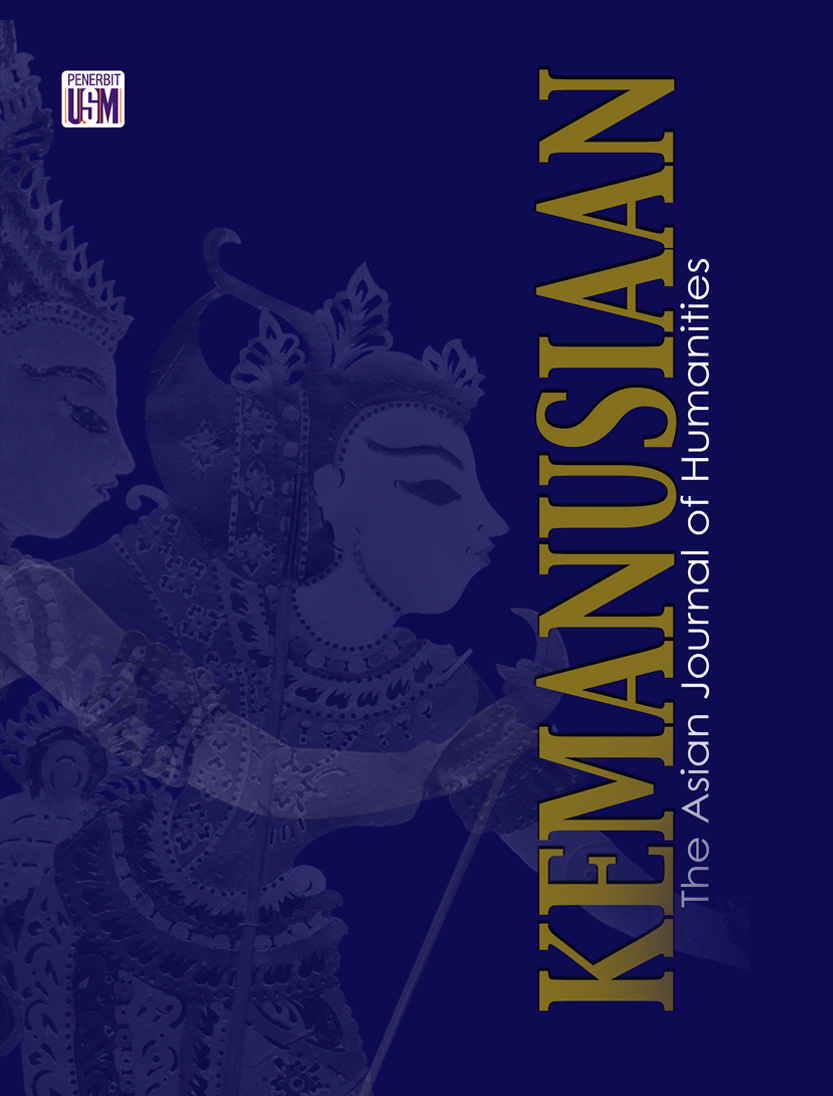KEMANUSIAAN
The Asian Journal of Humanities
Published by
Penerbit Universiti Sains Malaysia
| Past Issue - Volume 20, Number 1, 2013 |
Download EPUB version |
- Bahasa Melayu dan Konsep Kebenaran Ilmu Berdasarkan Pandangan Syed Muhammad Naquib al-Attas
(Malay Language and the Concept of True Knowledge from the Perspective of Syed Muhammad Naquib al-Attas)
Hashim Musa, Rozita Che Rodi, Halimah Pondo, Salmah Jan Noor Muhammad
Abstrak: Bahasa Melayu merupakan salah satu wadah pengucapan Islam setelah beratus-ratus tahun menjadi wacana penterjemahan dan pentafsiran al-Qur'an, al-Hadith, ulasan tentang epistemologi, ontologi, perundangan Islam dan sebagainya. Namun begitu, penaklukan dunia Melayu oleh kuasa Barat melalui proses sekularisasi ilmu, bahasa dan pemikiran telah memberi kesan terhadap pemikiran dan bahasa Melayu. Hal ini menyebabkan ilmu duniawi diberi keutamaan manakala ilmu agama Islam dianggap sebagai ilmu ukhrawi semata-mata. Perbincangan ini bermula dengan ulasan tentang proses Islamisasi umat Melayu dan bahasa Melayu berdasarkan teori Syed Muhammad Naquib al-Attas yang menyerapkan dua elemen, iaitu (1) unsur pemikiran rasional dan waras yang berbentuk akliah, logikal dan rasional, dan (2) mentransformasikan bahasa Melayu kepada bahasa Islam yang terserap dengan kosa kata Islam sebagai wadah pengungkapan dan penyebaran ilmu Islam dalam pelbagai genre persuratan. Artikel ini akan membahaskan bahawa dari sudut pandangan Islam, ilmu sekular Barat telah menimbulkan kekeliruan tentang konsep fakta, data, ilmu dan sebagainya dalam bahasa Melayu.
Kata kunci dan frasa: bahasa Melayu, Islamisasi, Syed Muhammad Naquib al-Attas, kebenaran ilmu
Abstract: The Malay language has been a medium of Islamic discourse for several hundred years, functioning among others, as the language of translation and interpretation of the Qur'an and Hadith, as well as the language of Islamic epistemology, ontology and legal edicts. However, the colonisation of the Malay world by western powers has been responsible in secularising the Malay mind and language. As a result, secular knowledge is now given importance whilst Islamic revealed knowledge is considered as religious knowledge only. This article begins with a discussion on the Islamisation of the Malays and Malay language based on Syed Muhammad Naquib al-Attas' theory which underlines two elements (1) the infusion of the elements of rational and sound reasoning, and (2) the transformation of the Malay language into an Islamic language, enriched with Islamic vocabulary, which functions as a discourse on Islamic knowledge in various literary genres. The article argues that, from the Islamic perspective, western secular knowledge has caused confusion in defining facts, data, knowledge and others in the Malay language.
Keywords and phrases: Malay language, Islamisation, Syed Muhammad Naquib al-Attas, true knowledge
Download
- "Form of Life" as Transcendental Dhvani Meaning
Venkataraman Prabhu
Abstract: "Meaning" has been an evergreen concept in Indian philosophy and poetics. Traditional Indian philosophical and literary schools have been competing with each other in the conceptual clarification of how one arrives at the meaning of a word and on what basis. This paper is concerned with one such conception of "meaning" called dhvani (suggested meaning), aiming at a philosophical rationale for the concept of dhvani. In discourses pertaining to Indian theories of meaning, dhvani occupies an important place. Often the concept of dhvani is found in poetic and literary discourses. This paper focuses on one important aspect concerning what makes suggested meaning possible. It focuses on the philosophical rationale of how one can understand a suggested meaning. How can a suggested meaning be understood by one and not by another? What are the conditions for the possibility for an individual to understand? To answer these questions, the author follows the philosopher Wittgenstein's notion of "form of life", developing it further to claim that "form of life" is the conditions for the possibility of having a dhvani meaning. Thus this paper aims at exploring the conditions that give rise to the possibility of suggested meanings through the concept of "form of life".
Keywords and phrases: meaning in Indian philosophy, dhvani, language-game, form of life
Download
- Understanding Muslim Theology in the Works of Shaykh Muhammad Ghazali
Benaouda Bensaid, Fadila Grine, Mohd Roslan Mohd Nor
Abstract: This inquiry explores Shaykh Ghazali's perspective on Muslim belief and change, specifically his views on how faith can sustain commitment to holistic change while assuring a favourable interaction with the intellect, without jeopardising human freedom or the laws and patterns of the universe. This study also examines Ghazali's views on the intimate connection between life and Muslim belief, as well as his ideas on the reformation of theological instruction as an effective means of re-shaping Muslims' intellectual identities and actualising change in contemporary Muslim societies. The study of Ghazali's intellectual analysis of Muslim faith and change is vital to understanding aspects of the current debate on religion, reform and modernity, particularly as he addresses many problems and issues pertaining to the methodology of religious understanding and practice in the context of Muslim life.
Keywords and phrases: Muslim belief, Muhammad Ghazali, change, Muslim theology, 'aqidah
Download
- Being Korean in Buton? The Cia-Cia's Adoption of the Korean Alphabet and Identity Politics in Decentralised Indonesia
Seung-Won Song
Abstract: This study investigates the motives behind the adoption of Hangeul, the Korean alphabet, by the Cia-Cia ethnic group in Baubau, Sulawesi, Indonesia. The import of Hangeul exemplifies how Indonesian peripheries have tried to form their own regions as distinctive entities against the nation. Their attempts to do so expand beyond the nation in hopes of emerging as new centres in a decentralised Indonesia, in which new power dynamics can be negotiated. Furthermore, this case portrays how the local population copes with growing ethnic identities and the mission of modernisation simultaneously.
Keywords and phrases: Hangeul in Buton, Cia-Cia ethnic group, Indonesia's identity politics
Download
Book Review
- Warisan Wilayah Utara Semenanjung Malaysia by Ooi Keat Gin, Pulau Pinang: Penerbit Universiti Sains Malaysia, Pulau Pinang. pp. 1–258.
Badriyah Haji Salleh


